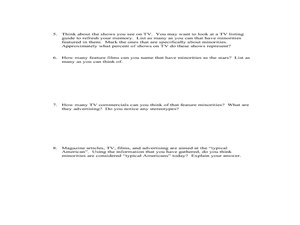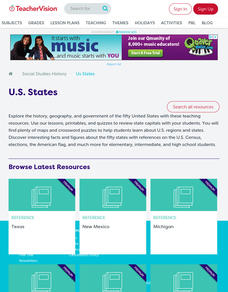Youth Outreach
Connecting the Separate Powers
Scholars demonstrate what they know about the separation of powers through role play. Two individuals act out a skit as the remaining class members discuss and decide whether the interaction they observed is an appropriate example of the...
School Improvement in Maryland
Supreme Court Case Overview I
As part of a study of the 14th Amendment to the United States Constitution, class members examine four Supreme Court decisions—Gitlow v. New York, Mapp v. Ohio, Gideon v. Wainwright, and Griswold v. Connecticut—that incorporated the due...
Center for Civic Education
Citizenship Schools and Civic Education During the Civil Rights Movement and in the Present
Your young historians will discover the importance that citizenship education has played in the social progress of the United States as they learn about early efforts to discourage African Americans from voting in the 1960s.
Curated OER
Minorities in Mainstream American Society
So many people fought for Civil Rights in the United States. Read about the Civil Rights Act of 1964, and discuss what the act guarantees. Then pass out a slew of magazines and encourage them to observe how often minorities appear in...
Curated OER
Civil War and Reconstruction
Factual statements relevant to the Civil War, Reconstruction, slavery, and the 13th, 14th or 15th Amendments are started on each slide, prompting students to complete the sentence with an important term . There are 32 questions phrased...
Teaching Tolerance
Changing Demographics: What Can We Do to Promote Respect?
America has always been seen as a melting pot to the world. Scholars research the concept of blending cultures in the United States and how it is changing over time. The final lesson of a four-part series analyzes the changing...
ProCon
Gun Control
According to some estimates, there are more guns than people in the United States. Learners decide if America should enact more gun control laws. They analyze information about gun deaths in the United States by year, read about the...
Center for History Education
Women's Rights in the American Century
Today, many young people find it hard to understand why it took over 150 years for women in the United States to get the right to vote—why there was even a need for the suffrage movement. As they read a series of primary source...
Center for History and New Media
The Impact of the Jim Crow Era on Education, 1877–1930s
Even though American slaves were officially emancipated in 1865, the effects of slavery perpetuated throughout the 19th and 20th centuries. Middle and high schoolers learn about the ways that discrimination and the Jim Crow laws...
ProCon
Gay Marriage
The first legal gay marriage in the United States occurred in Massachusetts in 2004. Since then, countless others have tied the knot. Scholars decide whether gay marriage should be legal by reading a history of the issue, analyzing the...
School Improvement in Maryland
Analysis of Marbury v. Madison
Should the United States Supreme Court have the power of judicial review? Instructors guide class members through a review of Marbury v. Madison and assist class members in writing a brief of the case. As independent practice,...
Friends of Fort McHenry
Privateers in the War of 1812: Soldiers or Thieves?
Do governments have the right to authorize individuals to perform illegal acts during times of war? Did the US government really employ pirates? Use the War of 1812 as your vessel to answering these questions through class discussion and...
Bismarck Public Schools
Executive Branch Worksheet
Consider using this assessment on the executive branch of the United States Constitution to help you work backward and plan your curriculum accordingly. The worksheet covers who specifically holds the office of chief executive,...
School Improvement in Maryland
Affirmative Action
Do the government's affirmative action policies promote equity in the United States? The Fourteenth Amendment to the US Constitution and affirmative action policies come under scrutiny in an activity that asks class members to...
Curated OER
Arguments Against Ratifying the Constitution
Students define federalism, Federalist, and Anti-Federalist, debate issue of ratification in classroom convention, and take vote on whether to add bill of rights. Three lessons on one page.
Curated OER
U. S. Constitution - Elections and Terms in Office
Students explore American elections and terms in office. In this U.S. government lesson, students respond to questions about voting rights. Students then write position papers on the existence of the Electoral College.
Curated OER
The Alien and Sedition Acts
Students discover the conflicts that arose between the political parties over issues of foreign policy and economics. Using the Internet, they research the Alien and Sedition Acts and how they relate to the U.S. Constitution. They...
Curated OER
Law Day: Constitutional Law Outline
Students receive information about laws. Some of the categories include powers of the federal government, federal powers vs. state powers, and the Bill of Rights. It is in an outline form that looks like the student follows along with...
Curated OER
Constitution
Ninth graders simulate a U.S. Supreme Court hearing concerning a First Amendment case about school prayer by participating in a hearing.
Curated OER
A More Perfect Union: Barack Obama's Race Speech at the National Constitution Center
Eleventh graders explore the process of perfecting the Union through changes made to the Constitution, and through the powers delegated to each branch of government. In this American Government lesson, 11th graders research various...
Curated OER
U.S. President: Facts
Students gather information from a chart. They become familiar with the names of the presidents of the United States. They complete a worksheet imbedded in this plan on the many facts associated with the Presidents.
Curated OER
Washington, D. C.: Crossword Puzzle
In this United States history learning exercise, students use the 14 clues in order to fill in the crossword puzzle with the appropriate answers pertaining to Washington, D. C.
Curated OER
The U.S. & Navajo Bills of Rights
Students are introduced to the United States and Navajo Bill of Rights. In groups, they compare and contrast the two documents and take notes to share with the class. To end the lesson, they write in their journals about their own...
Curated OER
The Beginnings of Constitutional Government
Students examine excerpts of Thomas Paine's Common Sense. In this early American history lesson plan, students read Paine's pamphlet and analyze the information according the rubric provided.
Other popular searches
- United States Constitution
- United Statesusus Constitution
- The United States Constitution
- Unites States Constitution

























